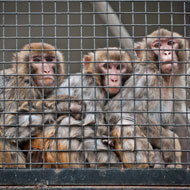Petition calling for pet primate ban handed to Defra

It is estimated that 5,000 primates are being kept as pets in the UK.
A petition calling for a ban on keeping primates as pets has been handed to Defra, after being signed by more than 55,000 people.
Supporters of the petition are urging environment secretary, Michael Gove, to bring an end to the sale of pet primates, as part of Defra’s ongoing work to review animal licensing.
The petition was organised by a coalition of veterinary and animal welfare organisations, such as the BVA, RSPCA, Born Free and Wild Futures, among others. It was spearheaded by MPs Sheryl Murray and Sue Hayman.
It is estimated that 5,000 primates are being kept as pets in the UK. Rescue charities receive around one call a week relating to the welfare of a monkey; and these incidents are on the rise.
Fifteen European countries have already introduced a ban on keeping all or some species.
Sue Hayman MP said: “Monkeys are simply not suitable pets and animal rescue charities are having to pick up the burden that soon follows once owners realise they can’t meet the needs of their monkey, or they are having to step in and rescue them from suffering.”
Vets, welfare charities, and cross-party MPs alike have grave concerns about the welfare of pet primates. They are often fed an inappropriate diet and kept alone in unsuitable housing such as bird cages. In sixty per cent of cases investigated by the RSPCA, primates were being kept alone.
Without adequate stimulation, primates may self-mutilate, pluck out their own hair or display behaviours such as rocking and self-hugging, which is suggestive of stress or trauma. Poor diet and lack of sunlight results in the painful condition, metabolic bone disease (known as rickets in humans), which is regularly seen in pet primates that end up in welfare charities.
Some pet primates may have been taken from their mothers at just a few weeks old to be hand-reared by humans. This can cause behavioural problems throughout their lives.
Rachel Hevesi, director at Wild Futures, said all of the monkeys taken into its sanctuary have physical and/or psychological problems as a result of their time as pets.
“The trend for keeping primates appears to be on the up - but, because of the specific needs of these animals, their level of suffering can be extreme,” she added. “As well as dietary and environmental requirements, primates are highly social animals and they have extremely complex behavioural and social needs - but sadly in many cases they are being kept alone.”
Eloise Shavelar, of the RSPCA, said she fears “hundreds more” are suffering behind closed doors.
BVA president John Fishwick added: “If the UK wants to fulfil its reputation for some of the highest standards of animal welfare in the world then UK governments must introduce a ban on the keeping of primates as pets.”



 The latest
The latest